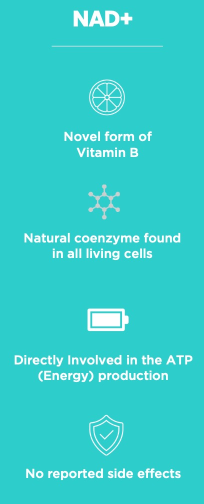Importance of NAD+ In the Human Body- NAD+ is crucial for a number of key physiological processes within the human body.
HUMAN BODY DIAGRAM
Genomic Stability


Genetic Expression
One of the mechanisms by which genetic expression successfully occurs in the body is through modifying a product known as histones. Histone modification is a NAD+ dependent process; a deficiency in NAD+ levels may disrupt histone modification, which may impair genetic expression. NAD+ deficiency may also result in the methylation of cellular DNA so that genes are not expressed appropriately; this is known as genetic silencing.

Immunity and Inflammation
In addition to the increased expression of macrophages, NAD+ also exerts anti-inflammatory effects during an infectious process. Studies have shown that the expression of inflammatory markers such as Tumor Necrosis Factor alpha (TNF-a) and Interleukin-6 (IL-6) significantly diminish when there are high cellular levels of NAD+ and its precursors.
Energy Metabolism
In the Krebs cycle, NAD+ functions as a coenzyme for the rate-limiting enzymes alpha ketoglutarate dehydrogenase, isocitrate dehydrogenase, and malate dehydrogenase. Alcohol metabolism, which occurs in liver cells, also requires NAD+ as a cofactor for the process's successful execution. A deficiency of NAD+ in the body may impact all these processes and negatively impact the effectiveness by which energy is generated and utilised by the body.
Circadian Clock
The accuracy and effectiveness of the circadian clock are due in part to cellular levels of NAD+. A deficiency of NAD+ may disrupt the circadian rhythm and result in effects such as daytime sleepiness, restless sleep, hormonal imbalances, and mood alterations, among others.


Cardiovascular Function
Furthermore, in the event of a significant cardiac event such as a transient ischemic attack or myocardial infarction, normal levels of NAD+ help in the recovery from injury.
Other studies have shown that a deficiency in NAD+ may result in cardiac disorders such as cardiac hypertrophy and fibrosis.
Kidney Function
Research has indicated increased protection against acute renal injury when individuals were given NAD+ supplements.
In addition, NAD+ supplements stimulated the release of prostaglandin E2, which serves to improve renal function after an acute renal injury.


Liver Function
Several studies have been performed that show that giving individuals NAD+ supplements may boost the liver's overall health, protect it from toxic illnesses, and enhance its capacity for regeneration after a hepatic injury.
Neurological Function
Additionally, NAD+ supplements have shown some benefits in treating and preventing some neurodegenerative diseases such as Alzheimer's disease; this is not definite, however, and there are several ongoing studies still exploring this possibility.

NAD+ plays in all the body's major processes
Benefits of IV NAD Therapy
One of the most common reasons why NAD+ IV therapy may be considered in some individuals is in the management of addiction. NAD+ IV benefits patients weaning off opioid, alcohol, chemical, or prescription drug dependencies; it may also serve to minimise the severity of withdrawal symptoms. While the mechanism of how NAD+ works in this regard is still under investigation, it is believed that NAD+ IV helps flush drugs out of the body and reduce cravings.
As has previously been stated, NAD+ has been shown to exert both protective and stimulatory effects on the brain. For this reason, NAD+ IV therapy may be administered to potentially enhance memory, improve concentration, improve the ability to focus, enhance brain regeneration, and improve overall neurological function. Studies are still ongoing regarding the precise means by which exogenous NAD+ supplementation exerts these effects.
NAD+ IV therapy has been used in the management of individuals with chronic fatigue and low energy levels. NAD+ is an essential cofactor in the glycolytic pathway and tricarboxylic acid pathways; these pathways result in Adenosine Triphosphate (ATP) production, which is the energy source of the human body. Through exogenous NAD+ supplementation, ATP levels in the body are increased which may have a resulting effect in boosting energy levels and reducing feelings of fatigue.
Due to its role in ATP production, some athletes have used NAD+ IV therapy to enhance their athletic capabilities and performance. NAD+ supplements also boost energy levels, improve cognition, and increase reaction times in athletes during competitions or other athletic events. In addition, studies have shown that NAD+ supplementation assists in muscle development as well as muscle repair, leading to muscle hypertrophy and muscle hyperplasia.
One of the more novel reasons why some individuals receive NAD+ IV therapy is in managing pain. NAD+ is known to exert significant anti-inflammatory actions within body and may be used to reduce the inflammation that typically occurs with pain and, thereby, offer some relief from pain. Studies into the use of supplemental NAD+ as a form of pain control are still ongoing and the results so far are not yet definitive.
POINTS OF SALE
Interested in our range of NAD+ products and diagnostics?
We have an extensive network of clinics, partners and resellers across the world.
GET IN TOUCH
If you'd like to buy our NAD+ products and diagnostic tools, please fill in the contact form below. A member of the NADclinic team will get back to you as soon as possible.









